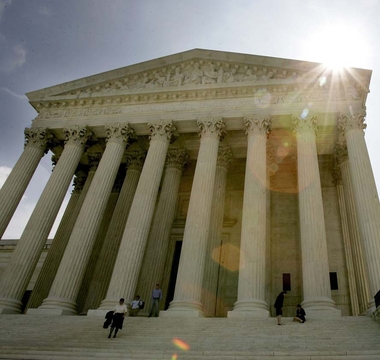Supreme Court declines to hear discrimination case of gay inmate on death row

The Supreme Court declined Monday to take up the case of a death row inmate, Charles Rhines, who sought to challenge his sentence based on juror statements that indicated discrimination based on Rhines' homosexuality.
His lawyers argued lower courts have blocked him from making his claims.
Rhines hoped the Supreme Court would allow the normal secrecy of jury deliberations to be pierced when there is an allegation of discrimination based on sexual orientation.
Rhines stood for trial in 1993 for the brutal murder of 22-year-old Donnivan Schaeffer. He was found guilty and sentenced to death.
After the guilty verdict, jurors learned that Rhines is gay. While deciding whether to sentence him to life imprisonment or death, they sent the trial judge a note including questions regarding his sexuality.
In 2015, the inmate received new public defenders who sought to amend his claims with evidence of the jury bias. In 2016, they conducted interviews with jurors producing affidavits where one juror recalled that during deliberations there was "disgust" over the fact that Rhines was gay. Another said that jurors, citing the fact that he was homosexual, "thought he shouldn't be able to spend his life with men in prison."
On appeal, Rhines relied on the notes to argue anti-gay prejudice had influenced the juror's sentencing decision.
The lawyers also pointed to a 2017 Supreme Court opinion holding that while ordinarily jury deliberations are secret and immune from judicial review, that rule can be pierced when it comes to evidence of racial bias.
Rhines' lawyers argued the Supreme Court's opinion should be extended to include evidence of discrimination based on sexual orientation.
"Anti-gay bias, if left unaddressed, risks systemic harm to the justice system, and in particular, capital jury sentencing," they told the justices in court briefs.
South Dakota Attorney General Jason R. Ravnsborg said the lower courts were correct to hold that the challenge was procedurally barred in part because Rhines had waited so long to make his claims.
Ravnsborg pointed to the brutality of the crime where the victim's brain stem was partially severed, and questioned the veracity of the jurors' affidavits.
Even if the claims weren't procedurally barred, he argued to the justices in briefs that the court should not expand its precedent: "Sexual orientation does not implicate the same unique historical, constitutional and institutional concerns as race."
"Rhines has now eluded justice for longer than he allowed Donnivan Schaeffer to live his life; there is no justice in further delaying the imposition of Rhines' deserved death sentence," he added.
Lawyers for the ACLU urged the court to step in and extend its precedent to Rhines' case.
"A decision to sentence a person to death because he is gay violates the Sixth Amendment no less than a decision to sentence him to death because he is black," wrote David D. Cole, the ACLU's national legal director.
By Ariane de Vogue CNN Supreme Court Reporter, The-CNN-Wire™ & © 2019 Cable News Network, Inc., a Time Warner Company. All rights reserved.
The Gayly. 04/15/2019 @6:33 p.m. CST





